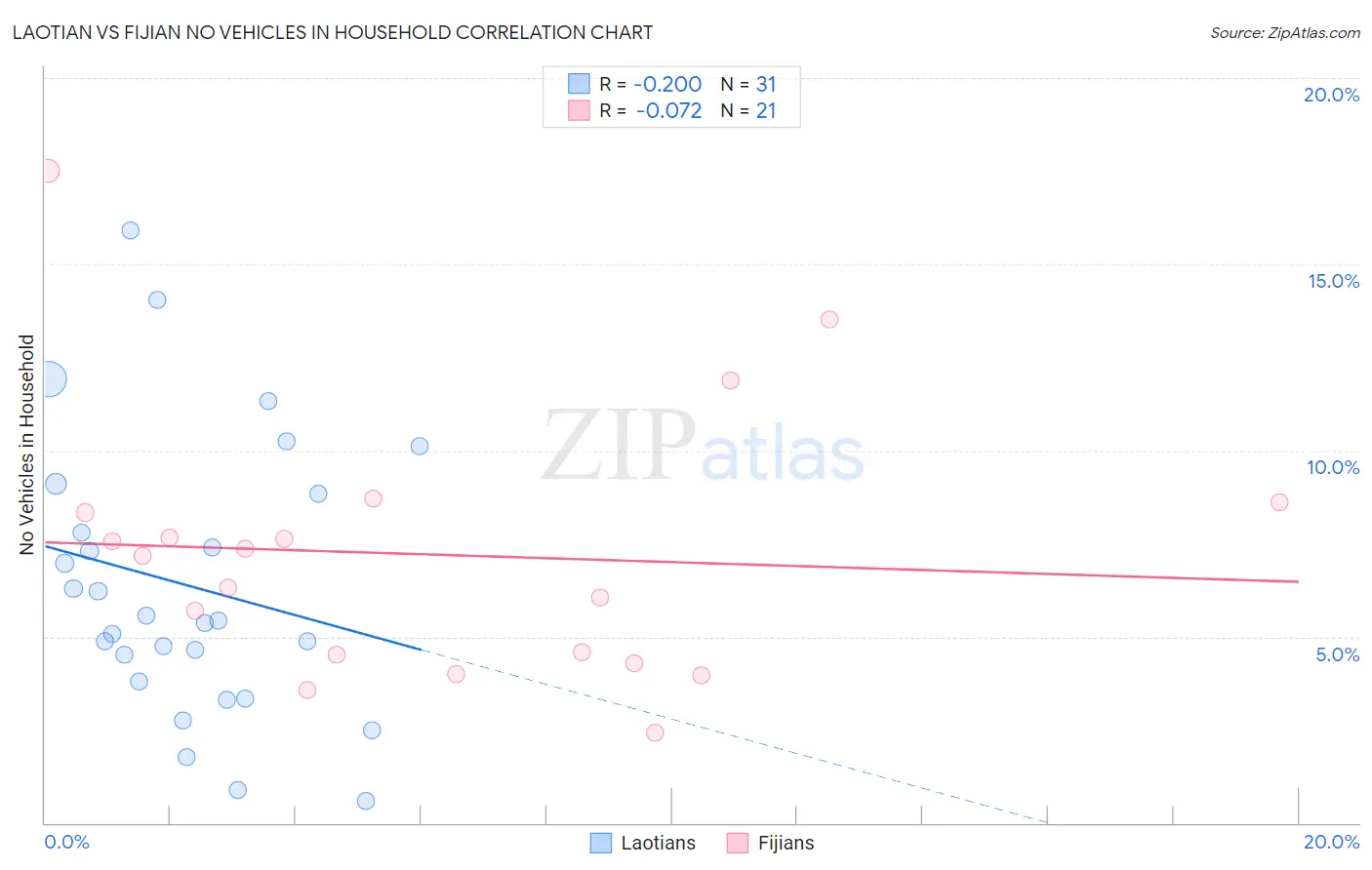Laotian vs Fijian No Vehicles in Household
COMPARE
Laotian
Fijian
No Vehicles in Household
No Vehicles in Household Comparison
Laotians
Fijians
9.1%
NO VEHICLES IN HOUSEHOLD
97.8/ 100
METRIC RATING
106th/ 347
METRIC RANK
9.5%
NO VEHICLES IN HOUSEHOLD
92.7/ 100
METRIC RATING
119th/ 347
METRIC RANK
Laotian vs Fijian No Vehicles in Household Correlation Chart
The statistical analysis conducted on geographies consisting of 224,346,725 people shows a poor negative correlation between the proportion of Laotians and percentage of households with no vehicle available in the United States with a correlation coefficient (R) of -0.200 and weighted average of 9.1%. Similarly, the statistical analysis conducted on geographies consisting of 55,930,698 people shows a slight negative correlation between the proportion of Fijians and percentage of households with no vehicle available in the United States with a correlation coefficient (R) of -0.072 and weighted average of 9.5%, a difference of 5.0%.

No Vehicles in Household Correlation Summary
| Measurement | Laotian | Fijian |
| Minimum | 0.59% | 2.4% |
| Maximum | 15.9% | 17.5% |
| Range | 15.3% | 15.1% |
| Mean | 6.4% | 7.2% |
| Median | 5.4% | 7.2% |
| Interquartile 25% (IQ1) | 3.8% | 4.4% |
| Interquartile 75% (IQ3) | 8.9% | 8.5% |
| Interquartile Range (IQR) | 5.0% | 4.1% |
| Standard Deviation (Sample) | 3.7% | 3.6% |
| Standard Deviation (Population) | 3.6% | 3.5% |
Demographics Similar to Laotians and Fijians by No Vehicles in Household
In terms of no vehicles in household, the demographic groups most similar to Laotians are Spanish American (9.1%, a difference of 0.090%), Zimbabwean (9.0%, a difference of 0.25%), Hispanic or Latino (9.1%, a difference of 0.26%), Mexican American Indian (9.1%, a difference of 0.35%), and Maltese (9.1%, a difference of 0.48%). Similarly, the demographic groups most similar to Fijians are Immigrants from Thailand (9.5%, a difference of 0.060%), Greek (9.5%, a difference of 0.11%), Puget Sound Salish (9.5%, a difference of 0.16%), Costa Rican (9.5%, a difference of 0.21%), and Chippewa (9.4%, a difference of 0.66%).
| Demographics | Rating | Rank | No Vehicles in Household |
| Yugoslavians | 98.3 /100 | #102 | Exceptional 9.0% |
| Seminole | 98.3 /100 | #103 | Exceptional 9.0% |
| Zimbabweans | 98.0 /100 | #104 | Exceptional 9.0% |
| Spanish Americans | 97.9 /100 | #105 | Exceptional 9.1% |
| Laotians | 97.8 /100 | #106 | Exceptional 9.1% |
| Hispanics or Latinos | 97.7 /100 | #107 | Exceptional 9.1% |
| Mexican American Indians | 97.6 /100 | #108 | Exceptional 9.1% |
| Maltese | 97.6 /100 | #109 | Exceptional 9.1% |
| Delaware | 97.2 /100 | #110 | Exceptional 9.2% |
| Immigrants | Kuwait | 95.1 /100 | #111 | Exceptional 9.4% |
| Armenians | 95.0 /100 | #112 | Exceptional 9.4% |
| Immigrants | Netherlands | 94.8 /100 | #113 | Exceptional 9.4% |
| Serbians | 94.3 /100 | #114 | Exceptional 9.4% |
| Navajo | 94.2 /100 | #115 | Exceptional 9.4% |
| Japanese | 94.1 /100 | #116 | Exceptional 9.4% |
| Chippewa | 93.8 /100 | #117 | Exceptional 9.4% |
| Greeks | 92.9 /100 | #118 | Exceptional 9.5% |
| Fijians | 92.7 /100 | #119 | Exceptional 9.5% |
| Immigrants | Thailand | 92.6 /100 | #120 | Exceptional 9.5% |
| Puget Sound Salish | 92.4 /100 | #121 | Exceptional 9.5% |
| Costa Ricans | 92.3 /100 | #122 | Exceptional 9.5% |